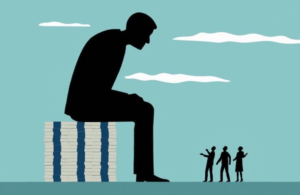From The Tyee: “Let’s talk about how it is in the interests of all those who hold disproportionate wealth and power in our capitalist economy to promote the idea that mental illness should be attributed to individual instead of societal factors, and therefore is best responded to with market-friendly individualist solutions such as psychiatric medication, apps, self-help books, consumptive self-care, or, if one is fortunate enough to afford it, therapy.
Let’s talk about all of this, because there is only one effective way for us to address the crisis of mental illness and addiction:
We must reverse the trend toward greater inequality by increasing taxes on corporations and the ultra-rich.
In The Inner Level, epidemiology professors Kate Pickett and Richard Wilkinson make a strong case for the damaging impacts of inequality on mental health, analyzing data from hundreds of studies from across the globe. They describe three typical responses to the status insecurity and multiple anxieties triggered by unequal societies. Some people become demoralized and depressed. Others become narcissistic and self-aggrandizing. And nearly everyone ‘becomes more likely to self-medicate with drugs and alcohol and falls prey to consumerism to improve their self-presentation.’
Notably, they found that ‘although [inequality’s] severest effects are on those nearer the bottom of the social ladder, the vast majority are also affected to a lesser extent.’ Rates of mental illness are higher in societies with bigger income differences, with more unequal developed countries reporting up to three times the rate of mental illness than more equitable ones. Community life is weaker; people are less likely to be involved in local groups, voluntary organizations, and civic associations, and people are less likely to feel like they can trust each other and are less willing to help one another.
‘Taken together, as of course they must be, both the quantitative and qualitative studies show how income inequality increases the strain on family life, and how things replace relationships and time spent together. The stories reinforce the statistics and vice versa. Parental experience of adversity is passed on to children through pathways that include parental mental distress, longer working hours, higher levels of debt and domestic conflict,’ the authors write.”












